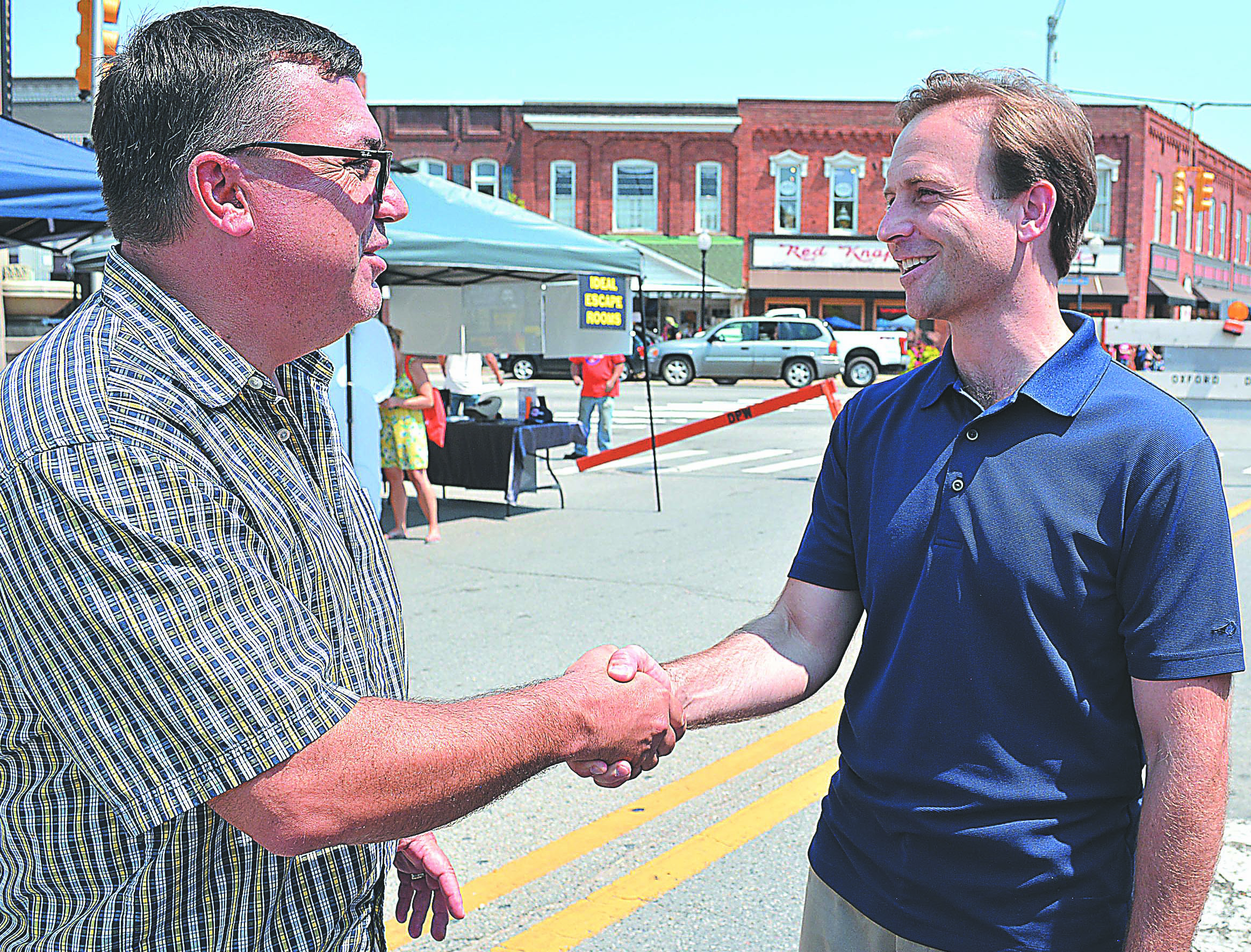
Downtown Oxford became a stop on the gubernatorial campaign trail as Lt. Gov. Brian Calley came to town Saturday afternoon to chat with voters in the final days before the Aug. 7 primary election.
“Lone Ranger Day is a good time to see everybody,” he said.
Calley, 41, was one of four candidates in the gubernatorial primary vying for the Republican nomination. The others were state Attorney General Bill Schuette, state Sen. Patrick Colbeck and Jim Hines, a physician.
Calley, who’s served as lieutenant governor since 2011, touted how much the state has improved over the last eight years.
“Michigan’s been on an incredible comeback,” said Calley, who noted he’s been an “integral part” of it.
He specifically cited the creation of more than 555,000 new private sector jobs since 2010 and the unemployment rate being the lowest it’s been in 17 years as examples of the comeback. The unemployment rate fell to 3.8 percent in June.
“We’re Number One in inbound migration of college graduates among the Great Lakes states three years in a row,” Calley said. “It’s a remarkable turnaround from where we started.”
Calley is proudest of the “cultural change” that’s occurred in Michigan as he claims residents are no longer accustomed to the state failing.
“We were on the bottom (for) so long before – last in nearly every economic category,” he said. “We had a problem where Michigan was kind of getting used to being on the bottom and that’s not who we are, that’s not where we come from.”
He explained the current administration helped change all that by getting “back to basics,” which included balancing the budget, reducing the debt and implementing tax and regulatory reforms, all of which were aimed at creating “an environment of success around our people.”
Calley noted eight consecutive balanced budgets have been passed, the state’s debt has been reduced by more than $20 billion and “we’ve got a billion dollars saved up in the rainy day fund.”
He wants to see this progress continue.
“We cannot afford to change course right now,” Calley said. “The message that I am carrying across our state is ‘yes, we’ve come a long way, but we still have a lot more work to do.’”
Although he believes “we’ve laid a strong foundation,” Calley believes there are still things that need to be done and problems that need to be solved.
“One of the biggest problems facing nearly every profession today is there’s not enough people to fill all the jobs,” he said.
He believes the state needs to continue investing in people by using everything from education to social service reform to connect more of them “with the skills they need to go out there and compete and win in an increasingly competitive global economy.”
Another issue is the cost of auto insurance, which he believes needs to be lowered.
“Auto insurance is high everywhere, but it’s unbearably high in some places in our state,” he said.
Calley wishes to continue fixing roads across the state. If elected, he’s vowed to speed up the state’s 2015 road-funding plan by a year. He’s looking to start spending an additional $1.2 billion annually on roads in 2020, instead of 2021 as originally called for in the plan.
He would also like to implement a “five-year rolling plan” where “everybody who shares the road right-of-way” would coordinate their repair, maintenance and replacement schedules with road construction projects.
This way, roads aren’t being paved one year, then torn up the next to install things like new sewer lines and culverts. He believes this would help lower costs for everybody concerned.
“We think it could save some pretty big dollars statewide,” Calley said.
Calley noted he has “a real plan for the future.”
“Other candidates have bullet points. They have goals. They have talking points,” he said. “I have actual plans. In fact, I put out a book. It’s called, ‘The Future of Michigan.’”
He said it contains chapter after chapter of details.
“(It’s) not just what I want to do, (it’s) how I’m going to get those things done,” he said. “It’s very unusual for a candidate to talk in specifics, but I think it’s important that we put all our cards on the table here . . . Without real plans, (they’re) just words.”

Leave a Reply